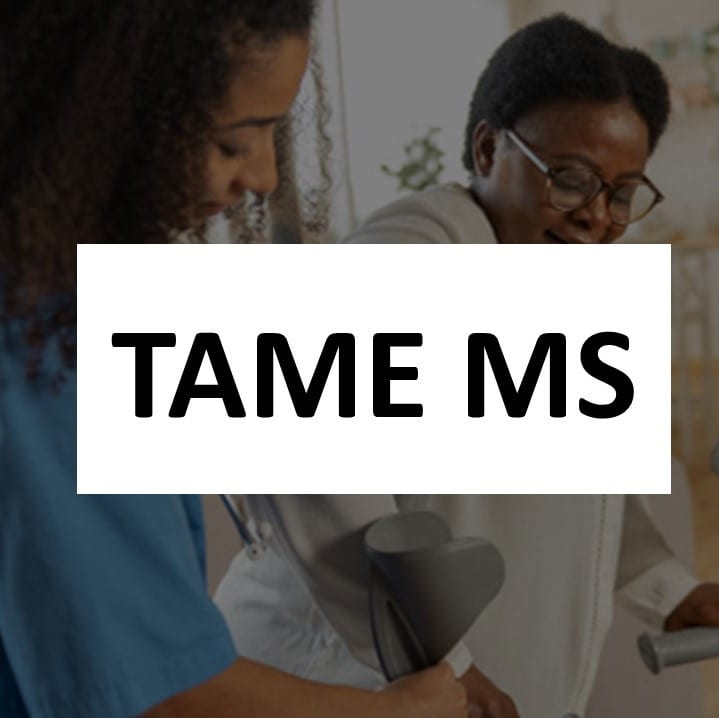Written by: Jessica Jernigan
Media contact: Adam Pope
Brooks Wingo, Ph.D., associate professor in the Department of Occupational Therapy, and Amy Goss, Ph.D., assistant professor in the Department of Nutrition Sciences, are part of a team awarded a $3.9 million grant from the U.S. Department of Defense.
The investigators will look at diet’s impact on mobility, physical and cognitive function, as well as on pain, fatigue, sleep, mood and anxiety, in people with multiple sclerosis.
Wingo is the principal investigator of this four-year project that comes through the Multiple Sclerosis Research Program. It is a follow-up to a pilot trial conducted by Wingo and Goss that was the first to look at the feasibility of the dietary protocol to be used in the current trial. They will be studying a calorie restriction diet and a low glycemic load diet.
The project, titled “Impact of diet quality and calorie restriction on physical function and patient-reported outcomes in multiple sclerosis,” is a multisite effort that collaborates with investigators at Washington University in St. Louis, as well as scientists with UAB’s Marnix E. Heersink School of Medicine and School of Public Health.
The study will be conducted at two sites across the United States and will recruit 100 individuals with multiple sclerosis for a randomized controlled trial. Over the course of eight months, participants will be supplied with food via grocery delivery services following a meal plan designed by the study’s registered dietitians.
For the first 16 weeks, the trial will focus on maintaining the participants’ weight, with participants randomized to follow either a low glycemic load or standard glycemic load diet. The second half of the study will follow the same glycemic load patterns, but all study participants will reduce their calorie intake by 500 per day.
“By analyzing four distinct treatments, we are hopeful to determine if weight loss is needed to improve MS outcomes, and if improving food quality leads to separate and additional benefits,” Wingo said.
Wingo and her team are embarking on a multidisciplinary approach, making the trial one of the most multifaceted and rigorous studies conducted on diet interventions in MS.
“Our primary outcome is physical function,” Wingo said. “But we will also assess cognitive function and collect blood work and imaging to assess other changes.”
A new approach, utilizing the Washington University team, uses neuroimaging to assess some of the participants’ neuroinflammation in response to the diet, and all trial participants will undergo a full-body MRI analysis.
Charged with overseeing the development of participants’ dietary protocols, Goss will use MRI analysis to assess body fat distribution and how organ lipid fat deposits or other body fat deposits are linked to poor metabolic health outcomes.
Goss explains that those with MS often have gait and balance disorders — combined with losing weight, they are at a greater risk of losing muscle mass, which could worsen their mobility. The imaging analysis will allow Goss to assess whether participants selectively lose fat and maintain muscle mass with a lower glycemic load diet.
“This study is unique because it is highly translatable,” said Goss, who also serves as assistant director of the Metabolism Core in the UAB . “We not only have the potential to change the lives of the people directly involved in the study but hopefully to improve health outcomes for all people living with MS. Our findings could possess the potential to change clinical care when it comes to multiple sclerosis.”
The study is designed to maximize adherence. In addition to food supply, participants will receive weekly phone calls with a team member to go over goals and meal preparation. They will also log their meals inside a research portal, making it user-friendly on both sides of the study.
Co-investigators at UAB include John R. Rinker II, M.D., associate professor in the Marnix E. Heersink School of Medicine, who has participated in multiple studies of diet and exercise for MS and worked on the pilot trial, and Stacey Cofield, Ph.D., associate professor, Department of Biostatistics in the School of Public Health, and associate dean, Recruitment, Retention and Diversity, who has expertise in clinical trial design, management and analysis in MS — including multisite trials and patient registry studies.
The grants are awarded to projects that the competitive review process finds “innovative, high-risk, high-reward research” and complement work being done at the National Institutes of Health. It is administered by the U.S. Department of Defense and funded by the U.S. Congress as part of the Congressionally Directed Medical Research Program.
The projected launch date for the program is November 2022.


